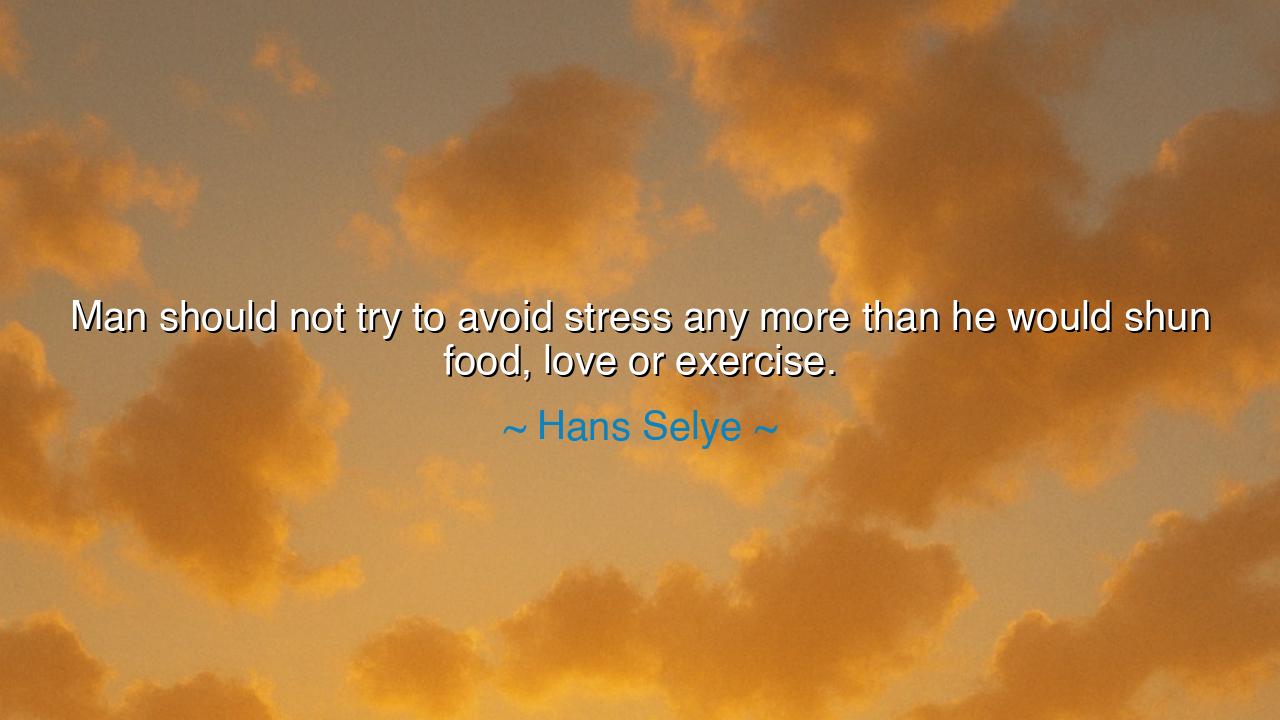
Man should not try to avoid stress any more than he would shun






Host: The room is quiet, the soft glow of the lamp casting a warm light across the space. Outside, the evening is still, and the calm atmosphere seems perfect for a conversation about stress, balance, and the complexities of human life. Jeeny sits on the couch, her legs tucked beneath her, a cup of tea resting in her hands. Jack, standing by the window, gazes out at the darkened world outside, clearly reflecting on something.
Jeeny: “Jack, I came across a quote from Hans Selye today that really made me think,” she says softly. “He said, ‘Man should not try to avoid stress any more than he would shun food, love, or exercise.’ What do you think about that?”
Jack: He turns slowly, a thoughtful expression crossing his face. “That’s a fascinating way to look at stress, isn’t it? Normally, we think of stress as something we need to avoid or manage. We’re always hearing about ways to reduce stress, but Selye seems to be saying that stress, in itself, is a necessary part of life — much like food, love, or exercise. It’s something that can be beneficial if approached in the right way.”
Jeeny: “Exactly. I think Selye is challenging the typical view of stress as something inherently bad. We often associate stress with negative feelings or health issues, but he’s suggesting that it’s an essential part of the human experience. Just as food, love, and exercise are necessary for physical and emotional well-being, so too is stress — when managed properly. It’s a part of life that can be used for growth and motivation, not just something to avoid.”
Host: The light in the room seems to deepen as the conversation touches on a more nuanced understanding of stress. Jeeny speaks with an understanding that stress, when approached in the right way, isn’t inherently harmful, but can be a driving force for growth and achievement. Jack stands still, reflecting on how often we try to avoid stress rather than learning how to balance it in our lives.
Jack: “It’s interesting because we think of stress as something that builds up over time and causes burnout or anxiety. But Selye is pointing out that stress isn’t always negative. In fact, the right kind of stress — like a challenging project, a personal goal, or even a workout — can strengthen us. It’s about adaptation. Just like how we build muscle through physical stress, our minds and bodies can adapt to certain levels of stress in ways that help us grow.”
Jeeny: “Yes! Stress can be a motivator. It can push us to meet deadlines, achieve our goals, or overcome challenges. Think about how we feel after a stressful situation that we’ve successfully navigated — there’s often a sense of accomplishment, right? The stress has driven us to succeed, to rise to the occasion. It’s the balance that’s key. Too much stress can be overwhelming, but a manageable amount can make us more resilient, more capable.”
Host: The conversation takes on a deeper tone now, as they reflect on the role stress plays in shaping our lives. Jeeny and Jack both agree that stress, when managed and understood, is not something to shy away from, but something that can drive us forward, help us grow, and build our resilience. Hans Selye’s words remind them that stress, like food, love, or exercise, is a necessary part of life — and one that can lead to growth if we approach it with the right mindset.
Jack: “It makes me think about how stress is often personal. What stresses one person might motivate another. Some people thrive under pressure, while others may feel overwhelmed. It’s about knowing your limits and finding a way to navigate stress so that it serves you rather than drains you. Selye is showing us that stress doesn’t need to be feared; it’s about how we manage it.”
Jeeny: “Exactly. And when we try to avoid stress completely, we’re avoiding the opportunities for growth that it brings. Just like with food, love, and exercise, too much or too little can be harmful, but the right amount of stress can push us to achieve things we never thought possible. It’s about balance — and learning how to integrate stress in a healthy way into our lives.”
Host: The room feels quieter now, as if the weight of their conversation has settled into something deeper. Jeeny and Jack sit together, reflecting on how stress is a necessary part of life, not something to fear, but something to learn to navigate with balance and awareness. Hans Selye’s words remind them that stress, like food, love, and exercise, is an essential force in human life — one that, when managed properly, can lead to growth, resilience, and accomplishment. It’s about embracing stress as part of the human experience, rather than trying to avoid it altogether.






AAdministratorAdministrator
Welcome, honored guests. Please leave a comment, we will respond soon